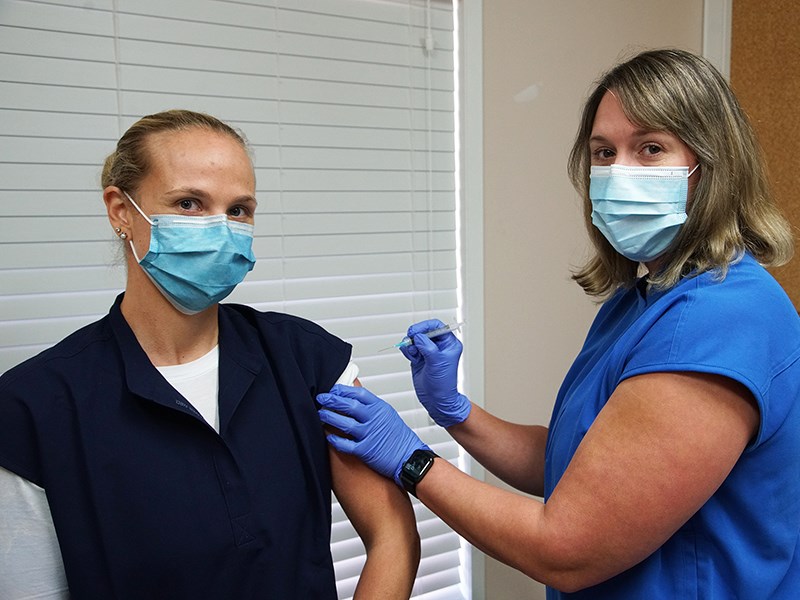It’s the time of year when flu and colds abound, but flu season in the midst of a pandemic is a whole new ball game. Although seasonal flu hasn’t arrived in Powell River yet, health-care workers in Powell River are gearing up to be busier than usual.
“It’s more important than ever for people to get the flu shot this year, for a couple of reasons,” said nurse practitioner Erin Berukoff. “Getting vaccinated is the best way to protect against the flu and its complications, which is a good reason to get the flu shot on its own. But we are also encouraging people to get vaccinated this year to help limit the burden on the health-care system.”
Flu symptoms can be similar to symptoms of COVID-19. If everyone does what they can to protect themselves and others from the flu, health care resources and efforts can be focused on helping other patients who need the system.
Canada’s National Advisory Committee on Immunization recommends that everyone over six months of age get an influenza vaccine, with rare exception. The vaccine is particularly important for people at high risk of serious illness, including children between six months and five years, pregnant women, seniors 65 and older, and people with certain health conditions. In BC, the flu shot is provided free of charge to anyone who fits into one of these categories, as well as to those able to spread the flu to high-risk people, and people who provide essential community services.
“There are lots of options in Powell River for people who want to get a flu shot,” said Berukoff. “There are drop-in clinics starting this week, you can visit your doctor or nurse practitioner, and many pharmacies are offering flu shots, too.”
To find a clinic, go to immunizebc.ca/clinics/flu.
“It’s important for people to understand that they can’t get the flu from a flu shot,” said Berukoff. “That’s because flu shots contain dead or weakened influenza viruses that cannot cause infection. Flu shots are considered safe and are the best way to protect against influenza.”
Redness, soreness or swelling can occur where the shot was given. Some people may also have a headache, muscle pains, or tiredness, which is more likely the first time someone is vaccinated for flu.
Getting the flu shot doesn’t guarantee someone won’t get the flu, since its effectiveness depends on how well-matched the vaccine is with the viruses that are circulating this season. In addition, the health status of each individual affects how well it works. But it is estimated that when a good match has been made, vaccination prevents the flu in 60 to 80 per cent of adults and children who receive it, and decreases the incidence of pneumonia, hospital admissions and death in the elderly population.
For further reading on flu vaccine myths and facts, go to healthlinkbc.ca/healthlinkbc-files/flu-vaccine-myth-facts.
Flu season in Canada takes place from November through April. Since it takes about two weeks after vaccination for influenza antibodies to develop in the body, people should get vaccinated as soon as possible for best protection.
“To avoid getting the flu, besides getting vaccinated, much of the same advice applies as protecting yourself and your loved ones from COVID,” said Berukoff. “Wash your hands frequently, avoid touching your face, and if you’re feeling unwell, stay home. If you do have symptoms, and you’re not sure whether you have the flu or COVID, do make an appointment to get tested.”
People can do that at prcomplexclinic.com.



